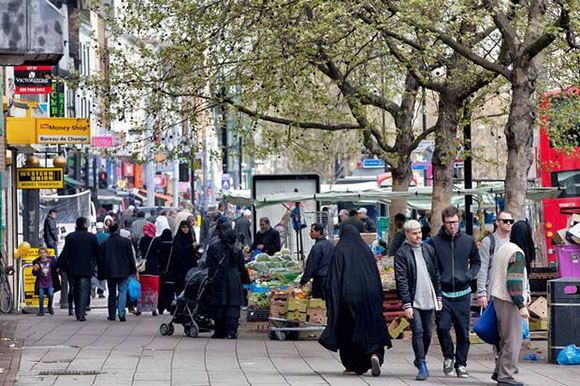The New Observer
May 27, 2014
Last Thursday’s local election results in Britain—in which the UK Independence Party (UKIP) took at least 163 seats (up from two) and polled around 23 percent of the vote—have revealed that nonwhites hate that party despite its leader’s efforts to woo the “ethnic” vote.
The blanket nonwhite rejection of UKIP is apparent from the local election results in London, which are dramatically different from the rest of the country: UKIP polled less than 7 percent of the vote in the capital city.
Establishment political commentators have tried to explain the disparity in any number of ways—but all have ignored the reality of race as the deciding factor.
The reason why UKIP polled so badly in London is because whites are now an outright minority in Britain’s capital city.
According to the 2011 Census—which is already over three years out of date, the number of white British people in the London made up just 45 percent of its residents and more than 40 percent of people living in the city were born overseas.
When that figure is computed into the election turnout, it can be seen that in fact UKIP’s 7 percent in the capital represents a significant portion of the remaining white population which actually turned out to vote, and is probably in line with the UKIP-white voting patterns in the rest of the country.
UKIP tried very hard to portray itself as a civic nationalist party, claiming that race had nothing to do with being British, and launched several high-profile campaigns to present itself as a multiracial party. It also ran a number of African and Muslim candidates in London.
The racial demographic shift in London was also to be seen in the Labour Party’s gains in traditionally Conservative Party-held councils within the metropolis (Merton, Redbridge and Croydon) also reflected the growing nonwhite population in those areas.
As the racial demographic trend increases to Britain’s other major cities—Birmingham and Manchester—so the swing to Labour will continue.
According to a recent report issued by the Policy Exchange study group, Britain’s nonwhite population “could potentially double from 8 million people or 14% of the population to between 20–30% by the middle of the century.
“Over the past decade, the UK’s white population has remained roughly the same while the minority population has almost doubled. Black Africans and Bangladeshis are the fastest growing minority communities with ethnic minorities representing 25% of people aged under the age of five,” the report said.
These figures are, of course, a gross underestimate. The official figures show that Britain is set to become majority nonwhite by the year 2050 at the very latest.
The “UKIP surge” therefore holds no realistic prospect of taking power or avoiding the demographic collapse of Britain into Third World status.
* The British National Party, predictably, polled extremely poorly in the few seats which it did contest. In most cases, its share of the vote dropped from between 20 and 30 percent to less than 1 percent.
The only result which bucked that trend was the re-election of a sitting BNP councillor in Pendle, most likely because of his local connection to the area and hard work in the community.
This single election victory, loudly touted on the BNP website, is in fact evidence that the party’s excuse for its poor results (which consists of claims that the media’s promotion of UKIP is the reason why the BNP vote has collapsed) is in fact completely without foundation. A UKIP candidate in the Pendle ward polled half of the winning BNP vote—something that should not have happened if the party’s “excuse” was actually valid.
 Daily Stormer The Most Censored Publication in History
Daily Stormer The Most Censored Publication in History



